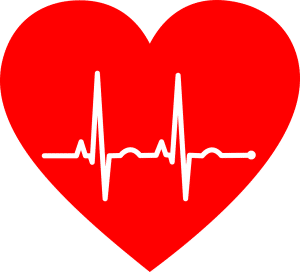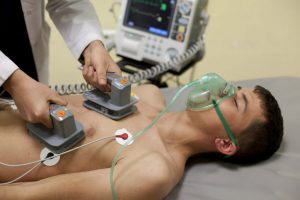AFib, known as Atrial Fibrillation, is an irregular heartbeat that can lead to stroke, heart failure, blood clots, and other heart issues. Almost 3 million Americans live with AFib. The condition is genetic, and can be passed down. Doctors suggest the solution to fixing an irregular heartbeat is by trying

cardioversion. This treatment is intended to shock your heart back into a rhythmic heartbeat, but what about the risks, and success rate?
What Is Cardioversion?
Cardioversion is when your heart is shocked in order to get it back to a more rhythmic heartbeat. If you have seen a defibrillator in your school, or work, then you know it is used to give shocks to someone during a heart attack. Cardioversion uses the same idea.
Before the procedure, you will be given anticoagulants for 3-4 weeks, reducing the risk of a blood clot. When it is time for the procedure, you will receive medicine that will control pain, and relax you, generally through an IV. Then, the doctor places patches on your chest, and sometimes back. The patches will send an electric current (shock) to your heart that will reset your heart rhythm. Along with the anticoagulants, the doctor will prescribe an antiarrhythmic medicine before and after the treatment to help maintain normal heart rhythm.
Risks
With every medical procedure come risks. During or after the procedure, a person may experience:
- Stroke- Cardioversion can dislodge a blood clot in your heart, which will send your body into shock, and cause a stroke. In order to prevent this, the anticoagulants taken beforehand are a must. Your doctor may even conduct a test called Transesophageal Echocardiogram to see if you have a blood clot in your heart.
- Skin Burns– This can occur from the electric current traveling through the patches.
- Fluid in Lungs– Fluid may build up in your lungs due to advanced AFib conditions that may lead to heart failure. The fluid will cause fatigue and shortness of breath.
- No Change in Condition- The procedure may not work, and you will have to go through another cardioversion or seek other treatment.
- Death- The antiarrhythmic medicine used before and after cardioversion may cause a deadly irregular heartbeat.
Success Rate
The risks mentioned are enough to shy anyone away from the treatment,

but the success rate is undeniable. Many studies conducted report that cardioversion success rate is 90%. 9 out of 10 people get back to a normal heartbeat. However, long-lasting results depend on your health. If you had AFib for longer than a year, then it may not last. For many people, this is the case. Therefore, some AFib users return after anywhere from a day, weeks, or months after going through cardioversion. Basically, if your AFib has been a part of your life for a long time, then the normal heart rhythm from the procedure may not last. You can try cardioversion a second time, but if that does not work, then a third time is even less likely to work.
If you were recently diagnosed with AFib, it would be best to discuss the option of cardioversion with your doctor. It may be worth a shot to get back to normal heart rhythm and reduce your chances of heart issues and complications in the future.
